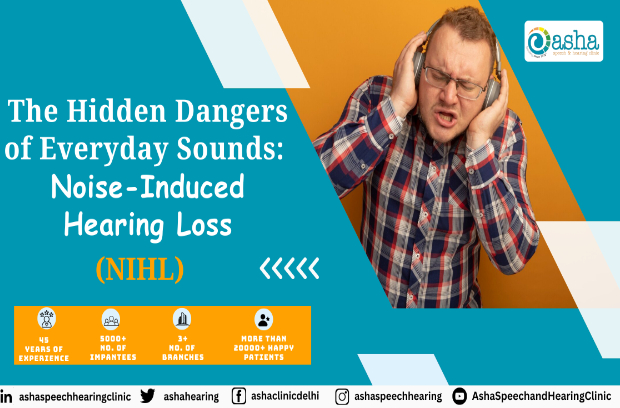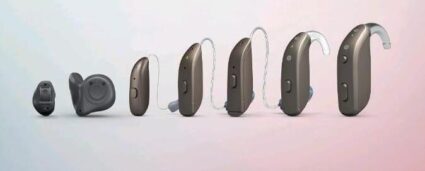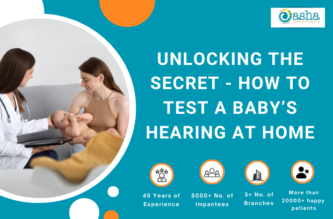- June 11, 2025
- Asha Agarwal
- Comment: 0
- blog
Can everyday sounds we listen to cause hearing loss? Yes, they can. In general, normal conversational sounds will be under 70dB and hence it will not affect your hearing in most cases. But, as louder noises such as those produced by lawnmowers, motorbikes, and blaring music can reach up to 120 dB, it may cause hearing loss over time. Also, noises over 120 dB, such as fireworks and emergency sirens can potentially damage hearing. Temporary or permanent noise-induced hearing loss (NIHL) occurs because of frequent exposure to hazardous, loud noises. As per research, around 7% of adults suffer from NIHL.
To understand the hidden danger of everyday sounds, continue reading this blog. Here, we have shared the causes, symptoms, diagnosis, and treatment of NIHL.
What is Noise-Induced Hearing Loss (NIHL)?
Noise-induced hearing loss happens when loud noises affect the inner ear structures. Normally, the sounds that we hear in our daily lives such as television, traffic, and background conversations will be at a safe volume and will not damage our hearing. However, too loud sounds of explosions and long-lasting sounds of workplace machines can damage the sensitive structures in the ears and cause NIHL.
People of all ages, including children, teens, young adults, and the elderly may suffer from NIHL. Noise-induced hearing loss can be either temporary or permanent, depending on the nature and severity of the damage. The cause of NIHL determines the degree of hearing loss.
Two types of NIHL exist.
Acoustic Trauma: Instant hearing loss caused by a single exposure to a loud, powerful sound (such as a gunshot or firecracker). In these cases, hearing loss may occur suddenly or gradually.
Chronic NIHL: Prolonged exposure to gradually softer sounds (e.g., hearing impairment from headphones). It could take weeks, months, or even years before you experience any symptoms.
How Do Loud Noises Damage Hearing?
Loud noises can have a long-term damaging effect on your hearing and it may diminish your ability to process sound. In the ear, the tiny hair cells that translate sound vibrations into electrical impulses for the brain to understand are particularly fragile and can be twisted, shattered, or even killed altogether by the sheer force of severe sound waves slamming against them. Hence, when you are exposed to extremely loud sounds, whether from heavy machinery, live music, or personal audio devices, the delicate structures within the inner ear are overstressed and strained. This damage builds with each encounter and gradually reduces your hearing function.
Early Warning Signs of NIHL
Several signs could indicate you are losing your hearing due to loud noise. Symptoms of NIHL can appear suddenly or develop gradually, depending on the causes. The following are some of the most common symptoms of NIHL:
-
- an ear pressure or fullness sensation.
-
- inability to perceive high-pitched noises, such as the singing of birds.
-
- tinnitus – a buzzing, ringing, or roaring in the ears
-
- distorted or muffled speech.
All these symptoms might linger for minutes, hours, or even days after noise exposure has ended. Your hearing may recover to normal, but still, the damage will be sustained. Eventually, your hearing may return, but continued exposure to loud noises can exacerbate the damage and result in permanent hearing loss.
Complications of NIHL
When the hearing capacity reduces, you might have a significant impact on your quality of life. You may experience generalized frustration or a decrease in sociability. Alternatively, you may always feel exhausted from straining to hear sounds around you. Apart from hearing loss, NIHL can result in:
-
- Anxiety
-
- Stress
-
- Depression
-
- Fatigue
-
- Increased heart rate
-
- High blood pressure
-
- Insomnia
-
- Irritability
How is NIHL Diagnosed?
If you suspect you may have NIHL, talk to your primary care physician or a healthcare provider. You may also approach an otolaryngologist or audiologist for hearing tests. To diagnose NIHL, specialists do several hearing tests, which may include
Pure-tone testing: Determines the loudest loudness that is audible at various pitches.
Auditory brainstem response (ABR): Measures how your brain and hearing nerves react to various noises.
Speech in noise testing: Determines your ability to distinguish speech in quiet contexts from noisy ones.
Speech Audiometry: Measures the loudness at which speech should be delivered for you to hear it and how well you understand spoken words.
Tympanometry: Assesses the movement of the eardrum and the functionality of the middle ear.
Otoacoustic emissions: Measures the function of hair cells in your inner ear.
Treatment Options for Noise-Induced Hearing Loss
The following are some of the effective ways to treat NIHL
Hearing Aids: There are various varieties of Hearing Aids, including those that are set behind or in the ear. Some increase sounds while simultaneously decreasing background noise.
Cochlear Implants: Cochlear Implants are surgically inserted devices that stimulate the auditory nerve when the native cochlea is destroyed. They are primarily used for those who have severe high-frequency hearing loss.
Therapy: Several therapies are available to assist you in adjusting to living with hearing loss. Some approaches include studying lip reading and relocating conversations to a quieter environment.
Sound Amplifiers: Aside from hearing aids, there are a variety of gadgets that can amplify and improve your hearing. This includes devices that improve the sound on your television or phone.
How Should You Prevent NIHL?
NIHL is the only type of hearing loss that is preventable. If you know the risks associated with noise and how to maintain good hearing health, then you can protect your hearing for the rest of your life. Here is how to do it:
-
- When participating in a loud activity, put on earplugs or other protection gear.
-
- Move away from the noise if you are unable to block it out or protect yourself from it.
-
- Be aware of potentially dangerous noises in your surroundings.
-
- Protect the ears of children who are too young to protect themselves.
Conclusion
Noise-induced hearing loss can make it difficult to enjoy everyday activities. Even while ear trauma cannot be reversed, you can shield your ears from future harm. Some therapies can help to recover from hearing loss as a result of noisy surroundings. If you believe you may have NIHL, visit the Asha Speech and Hearing Clinic. We have experienced clinical audiologists in our team to assess your hearing ability and provide individualized treatment for NIHL.
About Author
Asha Agarwal
Chief Audiologist & Director, Asha Speech and Hearing Clinics
Asha Agarwal, founder of ASHA Clinic, has been dedicated to transforming lives since 1996 through early intervention and personalized care in speech and hearing. Her mission: “Give joy of hearing and speaking by breaking barriers of silence.





